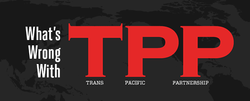What is Fast Track and the Trans-Pacific Partnership - Why we need to Stop Fast Track....

Nov 2nd - Dave Frengel, Chair, PA Chapter - Coaltion for A Prospersous America, (CPA)
www.prosperousamerica.org
www.tradereform.org
www.prosperousamerica.org
www.tradereform.org
 Arrow
Arrow
Click on Arrow at bottom of screen to begin video
Disclaimer: Special Interviews do not represent an endorsement for a person or organization by The Villages Tea Party.
Please do you own research .. our efforts are to keep you informed on important issues happening in this country.
Contact your representatives by: Phone, letter, email, FAX or Facebook and Twitter to register your opinion or concern.
Please do you own research .. our efforts are to keep you informed on important issues happening in this country.
Contact your representatives by: Phone, letter, email, FAX or Facebook and Twitter to register your opinion or concern.
______________________________________________________________________

_____________________________________________________________________

Nov 3rd
Trans-Pacific Partnership Agreement What is the Trans-Pacific Partnership Agreement (TPP)? The Trans-Pacific Partnership (TPP) is a secretive, multi-national trade agreement that threatens to extend restrictive intellectual property (IP) laws across the globe and rewrite international rules on its enforcement. The main problems are two-fold: (1) IP chapter: Leaked draft texts of the agreement show that the IP chapter would have extensive negative ramifications for users’ freedom of speech, right to privacy and due process, and hinder peoples' abilities to innovate. (2) Lack of transparency: The entire process has shut out multi-stakeholder participation and is shrouded in secrecy. The twelve nations currently negotiating the TPP are the US, Japan, Australia, Peru, Malaysia, Vietnam, New Zealand, Chile, Singapore, Canada, Mexico, and Brunei Darussalam. The TPP contains a chapter on intellectual property covering copyright, trademarks, patents and perhaps, geographical indications. Since the draft text of the agreement has never been offically released to the public, we know from leaked documents, such as the February 2011 draft US TPP IP Rights Chapter [PDF], that US negotiators are pushing for the adoption of copyright measures far more restrictive than currently required by international treaties, including the controversial Anti-Counterfeiting Trade Agreement (ACTA). The TPP Will Rewrite Global Rules on Intellectual Property Enforcement All signatory countries will be required to conform their domestic laws and policies to the provisions of the Agreement. In the US, this is likely to further entrench controversial aspects of US copyright law (such as the Digital Millennium Copyright Act[DMCA]) and restrict the ability of Congress to engage in domestic law reform to meet the evolving IP needs of American citizens and the innovative technology sector. The recently leaked US-proposed IP chapter also includes provisions that appear to go beyond current US law. The leaked US IP chapter includes many detailed requirements that are more restrictive than current international standards, and would require significant changes to other countries’ copyright laws. These include obligations for countries to:
Non-Transparent and On The Fast Track Despite the broad scope and far-reaching implications of the TPP, negotiations for the agreement have taken place behind closed doors and outside of the checks and balances that operate at traditional multilateral treaty-making organizations such as the World Intellectual Property Organization and the World Trade Organization. Like ACTA, the TPP is being negotiated rapidly with little transparency. During the TPP negotiation round in Chile in February 2011, negotiators received strong messages fromprominent civil society groups demanding an end to the secrecy that has shielded TPP negotiations from the scrutiny of national lawmakers and the public. Letters addressed to government representatives in Australia, Chile, Malaysia, New Zealand and the US emphasized that both the process and effect of the proposed TPP agreement is deeply undemocratic. TPP negotiators apparently discussed the requests for greater public disclosure during the February 2011 negotiations, but took no action. Why You Should Care TPP raises significant concerns about citizens’ freedom of expression, due process, innovation, the future of the Internet’s global infrastructure, and the right of sovereign nations to develop policies and laws that best meet their domestic priorities. In sum, the TPP puts at risk some of the most fundamental rights that enable access to knowledge for the world’s citizens. The US Trade Rep is pursuing a TPP agreement that will require signatory counties to adopt heightened copyright protection that advances the agenda of the US entertainment and pharmaceutical industries agendas, but omits the flexibilities and exceptions that protect Internet users and technology innovators. The TPP will affect countries beyond the 11 that are currently involved in negotiations. Like ACTA, the TPP Agreement is a plurilateral agreement that will be used to create new heightened global IP enforcement norms. Countries that are not parties to the negotiation will likely be asked to accede to the TPP as a condition of bilateral trade agreements with the US and other TPP members, or evaluated against the TPP's copyright enforcement standards in the annual Special 301 process administered by the US Trade Rep. Here’s what you can do: Are you in the United States? Tell U.S. lawmakers to stand up for your digital rights and preserve our constitutional checks and balances in government. Demand your state representatives oppose any initiative to enact Fast Track (aka Trade Promotion Authority), which hands their own constitutional authority to debate and modify trade law. ________________________________________ |

Nov 3rd
Congress Must Not Fast Track TPP to Ratification US lawmakers may soon introduce legislation to give the Trans-Pacific Partnership (TPP) a “fast-track” through Congress. Senate Finance committee leaders Sen. Max Baucus and Sen. Orrin Hatch have renewed their call to pass such fast-track legislation and hand over Congress' constitutional power to set the terms of US trade policy. Instead, under fast-track, (also known as Trade Promotion Authority) lawmakers would be limited to an up-or-down vote, and shirk their responsibility to hold proper hearings on its provisions. President Obama's trade negotiator, then, gets more leeway to push for unfair provisions that could not withstand public scrutiny. In other words: free rein to finalize agreements like TPP and the upcoming EU-US trade agreement. It is not surprising that Sen. Baucus and Sen. Hatch are the ones leading the charge, given they've been supporters of TPP from the beginning and have loudly touted the importance of fast-track to get this undemocratic agreement passed. That's dangerous, because the TPP has been negotiated in secret and includes a wide range of provisions that would negatively impact the Internet and our digital rights. Corporate advisors have had easy access to see and comment and draft text while Congress and the public have had little to no ability to influence its provisions. US Trade Representative Michael Froman admitted this week that he's recently been spending most of his time lobbying both Democratic and Republican Congress members to introduce and support a bill to authorize fast-track. Froman says that this authority would be “a manifestation of the partnership between Congress and the executive on trade policy and really gives Congress a very important and meaningful role in both the substance and the process of trade negotiations.” It's a strange thing to say when the opposite is true: it would actually give the Obama administration almost full control over trade deals. Last week EFF and 13 other organizations—including Amnesty International, Demand Progress, Free Software Foundation, and Knowledge Ecology International--sent a letter to the heads of US Congressional committees explaining that it is vitally important that democratically elected representatives are given the opportunity to review and amend international agreements to ensure that users' rights are included. They should not ignore the public interest by rubber-stamping agreements negotiated in near total secrecy. Fast track is the final step of locking the public out of trade negotiations. Congress, civil society, and the public at large should be consulted from the beginning over agreements like TPP. Compounding this problem, according to the Congressional Research Service, the US Trade Rep is negotiating TPP as if fast track authority is in place, acting as if it has the unilateral authority to further a one-sided agenda. We need to demand that lawmakers oppose fast track, that they call for hearings, and that they exercise their authority to oversee the US trade office’s secret copyright agenda. ______________________________________ |

